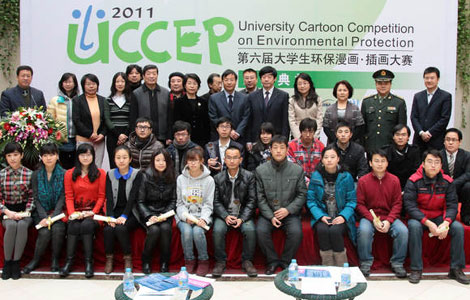Shanghai equals finance, expats say
Updated: 2012-01-10 08:08
By Wang Hongyi (China Daily)
|
|||||||||||
SHANGHAI - Shanghai's position as an international financial center is the aspect most widely recognized by foreigners, according to a report released by the Institute of Arts and Humanities of Shanghai Jiao Tong University over the weekend.
The report, The International Image of Shanghai, aimed to find out how foreigners see the city by polling more than 580 foreigners, including expats and short-stay tourists, through questionnaires.
Shanghai is sparing no effort to develop itself as a center for international finance, economic activity, trade and logistics in China. Among its four goals, the position as an international financial center was best known by foreigners, about 78.9 percent.
Then came economic center, with about 72.6 percent, while the position as a logistics center was least known with about 36 percent.
The Bund (Waitan) was most widely perceived as the main financial landmark in the city among foreigners, getting about 34.3 percent of the responses, much higher than the 18.8 percent received by the Lujiazui financial center.
"The historic and cultural attraction of The Bund is very popular among foreigners. More than two-thirds of the respondents said they knew the history of The Bund," said Liu Kang, dean of the Institute of Arts and Humanities, who directed the report.
He said the profound historic and cultural features of The Bund largely enhanced the popularity and visibility of Shanghai as a financial center.
More than half of the foreigners said they believed Shanghai was also a cultural center, and the Town God's Temple (Chenghuangmiao) topped the list of cultural landmarks in Shanghai.
Researchers said the word "architecture" was most frequently mentioned in an open question. About 55.8 percent said they most appreciate the buildings in Shanghai that feature a combination of Chinese and Western architectural styles.
Foreigners put a high value on the city's construction, and they are most satisfied with the city's transport network, recreational facilities and public security.
According to the report, the city's international flights, airport services and hotel reservations achieved more than 80 percent satisfaction among the foreigners surveyed.
However, only 20 percent of the respondents expressed their satisfaction with intellectual property rights (IPR) protection, since vendors selling pirated CDs, DVDs and books still can be seen widely.
Despite the first-class infrastructure facilities, the city should work hard to improve its soft power in building an international city, such as IPR, education and medical services, Liu Kang noted.
"Shanghai is a very international city and its financial center's position has attracted more foreigners come and work here," said Krista Pederson, who came to the city from the United States in 2007. She works in a consulting company.
"Life in Shanghai is very good and as comfortable as in my home country. Perhaps it's an example for international work and living," she said.
"Of course, it would be better and more convenient if taxi drivers could speak English," she added.
According to a report by the Shanghai statistics bureau last month, the city has more than 104,000 expats. It has the country's second-largest population of foreigners and overseas Chinese, including people from Hong Kong, Macao and Taiwan.
The report said more than half of the city's foreigners and overseas Chinese came to Shanghai primarily for long-term work or short-term business in 2010.
- Shanghai equals finance, expats say
- Luxury goods: to buy or sell?
- Wen's speech lifts stock market
- Foreign auto investment no longer 'encouraged'
- Wen urges for more support to real economy
- Caterpillar expands China research center
- China must brace for global shocks: PBOC
- Cartoon industry gets more animated









